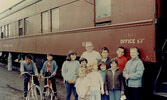A man of many talents - Glimpses of the Past with Karen Webster
If one were to look for an example of how to live life on a large scale that packs in many experiences and accomplishments they perhaps would benefit from examining the life and times of Dr. Charles Toll.
David Charles Edgar Toll (Charlie) was born on Sept. 18, 1896 on the E ½ Lot 35 Concession 2 farm in East Wawanosh of his parents, Frederick and Martha (Kernick) Toll; he was one of six siblings. There he learned the value of hard work and the ethics of community service. His was a musically-talented family who often spent evenings singing and playing instruments with Charlie playing the cornet. He was educated in the local schoolhouse and in Blyth, but had to commute from Blyth to Clinton on the London Huron and Bruce railway each day to attend senior classes there.
Charlie’s first employment was as a schoolteacher in Belgrave. In 1916, he enlisted in the Canadian Overseas Expeditionary Force. Following his discharge, he was teaching in Parry Sound and it was here that he married Laura Argue in 1924. Like many young people of his era, Charlie taught school for a number of years in order to finance education for a second career. The following year he enrolled in Dental College in Toronto. Laura was very supportive of Charlie’s vocation and she acted as his receptionist and dental assistant through the years.
Charlie’s first practice was in his hometown of Blyth, starting in 1928. This was the place where he, when a youth, had been a member of the Blyth band under the leadership of Sam Gidley. Charlie was dismayed to learn that the band was no longer in existence, the musical instruments being unused and many young people did not have jobs and were just hanging around. He took action and, in 1929, the Blyth Citizens’ Band was formed with Dr. Milne as the Honorary President, Rev. Weir, President, A.W. Culp as Secretary-Treasurer and an executive made up of James Tierney, Dr. C. Toll and G. D. Leith. Charlie often instructed youngsters in his dental office while waiting on the freezing to take hold on his patients. The Citizens’ Band provided many enjoyable concerts and in addition promoted plays.
As well as his practice in Blyth, Charlie held clinics in Monkton on Wednesdays and on Saturday afternoons and evenings in Dungannon. He also visited local schools and reported on the dental health of the school children. He was often a guest speaker for groups such as the local Women’s Institute, where he advocated for good dental hygiene.
When the world was at war once again, Charlie closed his Blyth office in 1941 and joined the Army Dental Corps, serving in Kingston, Petawawa, Ottawa, on a training ship in the St. Lawrence River and in Vancouver.
In his lengthy career, Dr. Charles Toll had practices in London, Ontario, Trail and Vancouver, British Columbia (where he was Vancouver’s Dental Supervisor of Schools) and Seaforth. It was in Seaforth in 1974 that he once again initiated bands called the Seaforth Junior Band and the Seaforth-Dashwood Band and, in recognition of his service there, he was named the Seaforth Citizen of the Year in 1981.
A theme running through Charlie’s many endeavours was that of community service. Often, instead of holidays, he would embark upon dental service to underserved areas. He served the citizens of Northern Canada under the auspices of the Hudson Bay Company. In 1947, he was on such a trip when the supply ship called the Nascopie departed from Montreal to visit settlements and islands north of the Arctic Circle to see patients there. In fact, he had a patient in his chair on board the ship when it ran aground in the ice fields on the northern tip of Baffin Island at Cape Dorset. All passengers were able to leave the ship safely, but belongings were lost.
In 1968, another of Dr. Toll’s adventures took him and Laura to work on a Northern Ontario Railway Dental Car, which was one of three that serviced the remote areas. The couple lived in one part of a railway car and the other part was a dental office. A second railcar would follow along with dental and other supplies. These railcars would be carried along the route and would stop over at predetermined locations for a period of time, according to a schedule. In this way, people living in remote, bush-covered areas would have access to dental services. One of these traveling dental offices travelled a route from Sudbury to Port Arthur (Thunder Bay). The Ontario Department of Health paid for the dental work for school children and this was done during the day. Anyone else needing care had to pay for it themselves and sometimes the payment was in goods like venison. This care was delivered in the evening. Patients were natives and workers in mines and lumber camps.
In his later years, Charlie’s volunteer dental work took him to Jamaica, Trinidad, Barbados and Montserrat, where he operated clinics for Operation Friendship.
Always up for adventure, in 1966, the Tolls visited Kenya, Bombay, New Delhi and Agra in India, Singapore, Hong Kong, Tokyo and Hawaii, and managed to do so in only 30 days.
Even human dynamos eventually wear out and this one ceased his earthly journey on December 2, 1987, leaving behind his beloved helpmate, Laura, and daughter Jill. Not surprisingly, Charlie had even made plans for his final send off with detailed instructions for his funeral. In addition, he had arranged for his grave marker in Blyth Union Cemetery to be a large white fieldstone from the farm where he was raised. This unique marker is only fitting for a fellow who, himself, was out of the ordinary.

